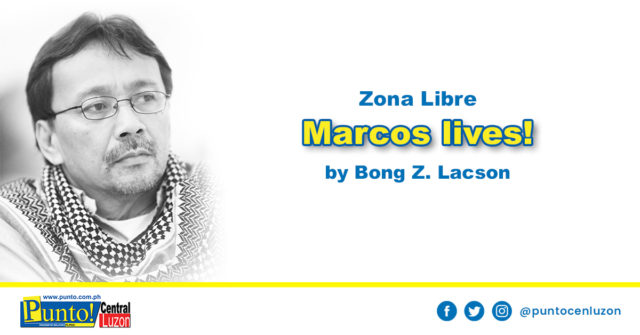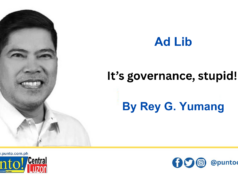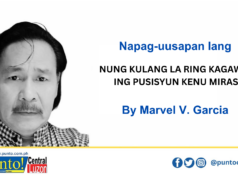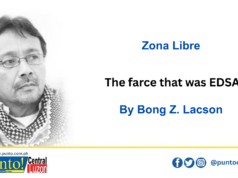IF WE accept life as struggle, and history as the continuing struggle for freedom, we realize the necessity of revolution, and from that, the imperative of the militant creed.
I believe, therefore, in the necessity of Revolution as an instrument of individual and social change, and that its end is the advancement of human freedom.
I believe that only a reactionary resistance to radical change will make a Jacobin, or armed, revolution inevitable, but that in a democratic society, revolution is of necessity, constitutional, peaceful and legal.
I believe that while we have utilized the Presidential powers to dismantle the violent revolution and its communist apparatus, we must not fail our people; we must replace the violent revolution with the authentic revolution – liberal, constitutional and peaceful.
I believe in democracy as the continuing revolution; that any other revolution is unjustified if it cannot meet the democratic criterion.
I believe that even if a society should be corrupted by an unjust economic or social system, this can be redressed by the people, directly or indirectly, for democracy has the powers of self-rejuvenation and self-correction.
I believe that in the troubled present, revolution is a fact, not merely a potential threat, and that if we value our sacred rights, our cherished freedoms, we must wrest the revolutionary leadership from those who would, in the end, turn the democratic revolution into a totalitarian regime.
I believe that in our precarious democracy which tends towards an oligarchy because of the power of the wealthy few over the impoverished many, there remains a bright hope for a radical and sweeping change without the risk of violence. I do not believe that violent revolution is either necessary or effective in an existing democracy.
I believe that our realization of the common peril, our complete understanding of our national condition, will unite us in a democratic revolution that will strengthen our democratic institutions and offer, finally, our citizens the opportunity of making the most and the best of themselves.
I believe that democracy is the revolution, that it is today’s revolution.
This is my fighting faith.
So concluded Today’s Revolution: Democracy penned by Ferdinand Edralin Marcos on Sept. 7, 1971.
One year and two weeks hence, Marcos applied his theory of the democratic revolution with Proclamation No. 1081, placing the whole Philippines under Martial Law.
And the rest, as clichéd, is history? More its permutation, the very revolution Marcos idealized as people-liberating, he himself turned totalitarian.
Inevitably leading to another revolution romanticized as the people’s but itself turning into an oligarchy – the rich that Marcos banished returning home with impunity, getting back – and more – that which was, rightfully, if forcibly, taken from them.
Thus, gone full circle – full vicious cycle – has Philippine society. Thus, Marcos, this time in Revolution from the Center in 1978:
NOW ANY society in which most of the people are poor is always in danger of having its political authority corrupted and dominated by the rich minority.
In the Philippines, the real power lay back of the shifting factions, in the hands of a few rich families strong enough to bend Government to their will. This oligarchy intervened in government to preserve the political privileges of its wealth, and to protect its right of property.
This intervention of wealth in politics unavoidably produced corruption. And when this practice seeped through the whole of society itself, the result was moral degeneration. So, the Philippine political culture equated freedom with self-aggrandizement, and the politics of participation, so essential in a democracy, with the pursuit of privilege.
Oligarchic “values” permeated society all the more easily because the rich controlled the press and radio-TV. The press particularly became the weapon of a special class rather than a public forum. The newspapers would noisily and endlessly comment on the side issues of our society, but not on the basic ones:
for example, the question of private property.
The oligarchic propaganda was that somehow, with the election of “good men” – good men who please the oligarchs – mass poverty would come to an end. The search for “better men in politics” and not institutional change; a “higher political morality,” and not the restructuring of society – this was the oligarch’s ready answer to the question of change.
Verily prescient, if not prophetic, the exactness of Marcos’ words applying to all presidents after him, not the least of whom the BS Aquino III. Least in words though, and most in (mis)deeds, Rodrigo Roa Duterte, in a worse image, in the worst likeness of the dictator.
Aye, the more things change, the more they remain the same. Or as our favourite Irish saying puts it: “There is no present, there is no future. Only the past happening over and over, again and again.”
(Marcos would have been 102 this Sept. 11. But for the Duterte add-on, this column first came out as is on Sept. 16, 2013.)





